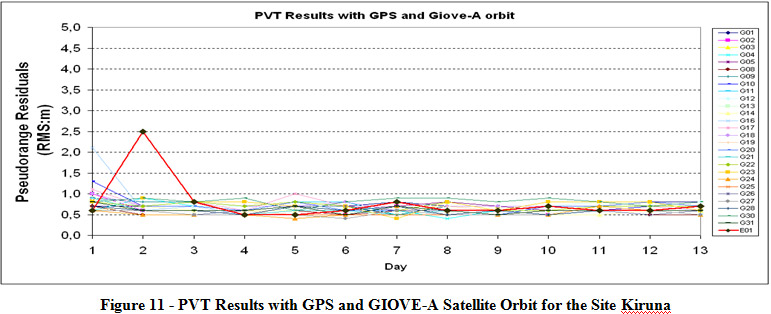| GNSS | |
Precise Orbit Determination of a Galileo/GIOVE-A Satellite
where
![]() satellite clock corrections at 00:00:00 on Jan. 09, 2008
satellite clock corrections at 00:00:00 on Jan. 09, 2008
![]() satellite clock corrections from 00:00:00 Jan. 09, 2008 to 00:00:00 Jan. 21, 2008
satellite clock corrections from 00:00:00 Jan. 09, 2008 to 00:00:00 Jan. 21, 2008
From the figure it can be seen that the GIOVE-A satellite clock correction changed about 450 ![]() from Jan. 09, 2008 to Jan. 21, 2008, but the GPS satellite clock corrections changed only about 18
from Jan. 09, 2008 to Jan. 21, 2008, but the GPS satellite clock corrections changed only about 18 ![]() (see Figure 15 ) at the same period. It is unclear why the GIOVE-A clock shows so large changes. The Figure 16 and Figure 17 show the satellite clock daily change rates. GPS satellite clock corrections show about ±1.5
(see Figure 15 ) at the same period. It is unclear why the GIOVE-A clock shows so large changes. The Figure 16 and Figure 17 show the satellite clock daily change rates. GPS satellite clock corrections show about ±1.5 ![]() of daily change rate, but GIOVE-A shows about 40
of daily change rate, but GIOVE-A shows about 40 ![]() daily.
daily.
CONCLUSION
The GIOVE monitoring shows that since end of October 2008 the data are continuously received and are reliable and usable for navigation purposes (with GPS satellites). The orbit parameters with the received ephemeris was checked with TLE orbits as a first rough evaluation whether the ephemeris data are applicable.
Using double differences of the GIOVE-A satellite carrier-phase measurements for precise orbit determination can achieve relatively high accuracy of results. Due to fact that currently not enough Galileo satellites are in space, the only way to form double differences of carrier-phase measurements is to form double differences between GIOVE-A or GIOVE-B and GPS satellites (DDIC). In order to form such double differences, the GIOVE satellite measurements shall be synchronized with the GPS time reference. The different time reference bias, system bias and so on shall also be solved. The results of daily orbit determination using the DDIC method and the related PVT results with the GIOVE-A orbit show indirectly that the accuracy of the such determined GIOVE-A satellite orbit can achieve ±0.2 m – ±0.8 m levels. The most of satellite clock solutions can also reach ns levels. Therefore, the DDIC method as a new approach can be used for high accuracy of Galileo satellite orbit determination.
ACKNOWLEDGMENTS
The DDIC method is developed and implemented based on the Bernese GPS software version 5.0 within the project GalTeC supported by the DLR on behalf of the German Ministry of Economics and Technology.
The GIOVE-A measurements used for the development and validation of the method was kindly provided by ESTEC/ESA in Noordwijk.
We would like to take this opportunity to thank our colleagues, Dr. Blomenhofer, Mr. Ehret, Mr. Glaser, Mr. Kubitz, Mr. Monzel and Mr. Rosenthal for their support and comments.
REFERENCES
[1] H. Su, B. Zimmermann: Precise Orbit Determination of a Galileo/Giove-A Satellite using Double Differences of Carrier Phase Measurements Inter Constellations of GPS/Galileo and Initial Results, ION ITM 2009, Anaheim, CA, USA
[2] http://www.giove.esa.int
[3] http://www.galtecproject.de
[4]W. Ehret, H. Su, E. Kubitz, O. Glaser, E. Blomenhofer: Continuous GNSS Performance Monitoring, Prediction and Information Services via GalTeC, ION GNSS, 16-19 September 2008, Savannah, Georiga, USA
[5] E. Rooney, M Unwin, G. Gatti, M. Falcone, S. Binda, M. Malik, D. Hannes: GIOVE-A In Orbit Test Results, ION GNSS 2007, Fort Worth, TX, USA
[6] A. M. Garcia, R. Piriz, V. Fernandez, D. Navarro-Reyes, F. Gonzalez and Jörg Hahn: GIOVE Orbit and Clock determination and Prediction: Experimentation Results, ENC 2008, Toulouse, April 22-25, France
[7] M. Heinze, D. Svehla, D. Voithenleitner: Kombinierte Prozessierung der GIOVE-A- und GPS-Beobachtungen der Galileo Experimental Sensor Stations, FGS Workshop, 16.-18.07.2008, Bad Kötzting, Germany
[8] Jörg H. Hahn, Francisco Gonzalez, Pierre Waller, Daniel Navarro-Reyes, Ricardo Píriz, Álvaro Mozo, Virginia Fernández, Marta Cueto, Patrizia Tavella, and Ilaria Sesia: GIOVE-A Apparent Clock Assessment and Results, 39th Annual Precise Time and Time Interval (PTTI) Meeting, November 26 – 29, 2007, Long Beach, California, USA
 |
|
||||
 |
|
||||
My Coordinates |
EDITORIAL |
|
His Coordinates |
François Erceau |
|
News |
INDUSTRY | GPS | GALILEO UPDATE | LBS | GIS | REMOTE SENSING |
|
Mark your calendar |
JUNE 2010 TO NOVEMBER 2010 |
Pages: 1 2














 (No Ratings Yet)
(No Ratings Yet)





Leave your response!